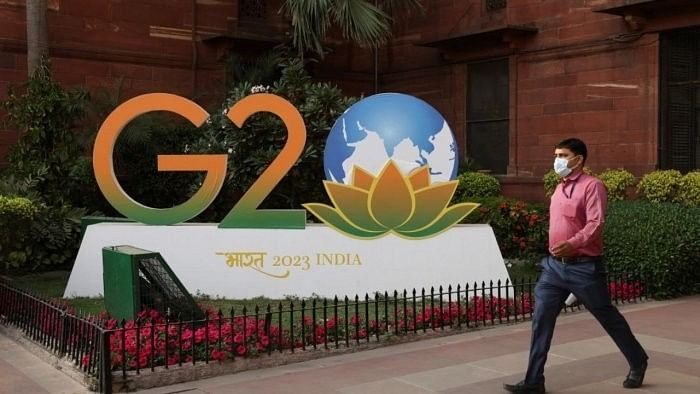
A source in New Delhi said that it was a combination of Prime Minister Narendra Modi’s “magic and guarantee” that helped reach the consensus over the G20 Delhi Declaration.
Credit: PTI Photo
It took about 200 hours of non-stop negotiations to reach a consensus on the text of the paragraphs on the Russia-Ukraine conflict in the 'Delhi Declaration' that the G20 leaders adopted on Saturday.
A day after the New Delhi Leaders' Declaration was adopted by the leaders of the major economies of the world, India’s G20 Sherpa, Amitabh Kant, revealed that the diplomatic breakthrough came after “200 hours of non-stop negotiations, 300 bilateral meetings and 15 drafts”.
A source in New Delhi said that it was a combination of Prime Minister Narendra Modi’s “magic and guarantee” that helped reach the consensus over the G20 Delhi Declaration.
The most complex part of the entire #G20 was to bring consensus on the geopolitical paras (Russia-Ukraine),” Kant wrote on X on Sunday as the two-day summit came to its end.
He earlier lauded his “young, dynamic and committed” team comprising four Indian Foreign Service (IFS) officers – Abhay Thakur, Ashish Sinha, Eenam Gambhir and K Nagaraj Naidu – for delivering the “100% consensus” on the ‘Delhi Declaration’. “Outstanding work, all credit to them”.
Kant, a retired Indian Administrative Service (IAS) officer, was the CEO of the NITI Aayog before being appointed as India’s G20 Sherpa in July 2022 – a few months before Prime Minister Narendra Modi took over the rotating presidency of the premier forum for international economic cooperation from Indonesian President Joko Widodo.
"They gave me sleepless nights and the most difficult time of my life,” he wrote on X after posting a picture with his counterparts from other G20 nations. "They are the toughest and most professional negotiators in the world," he wrote about the Sherpas of the other G20 nations.
The Sherpas and Sous Sherpas lead the respective national teams in negotiations on joint statements or declarations to be adopted by the leaders of plurilateral or multilateral organisations in the summits.
Uncertainty loomed large over the G20 Delhi Declaration even a day before the 18th summit of the intergovernmental forum commenced at Bharat Mandapam in the national capital of India, particularly due to differences between the West, led by the United States, and Russia over the war in Ukraine.
A meeting of the G20 Sherpas at Manesar in Haryana just days before the summit had failed to end the impasse.
The breakthrough came after a new draft text on the geopolitical issue was prepared and circulated by India, the host of the summit, among the G20 delegations just hours before the leaders commenced the annual conclave at Bharat Mandapam on Saturday. It was accepted by all and inserted in the Delhi Declaration, which was then adopted by the leaders.
“It is a convergent consensus rather than a divisive consensus,” a source in New Delhi said on Sunday, underlining that the approach to the Russia-Ukraine conflict reflected in the 'Delhi Declaration' was based on a "stable" framework to deal with the crisis, unlike divisive consensus that was always "fragile".
"The story of the consensus is a remarkable one and the overall approach in the document reflected a larger context. The paragraphs relating to the Ukraine conflict are much more than transactional," the source said.
